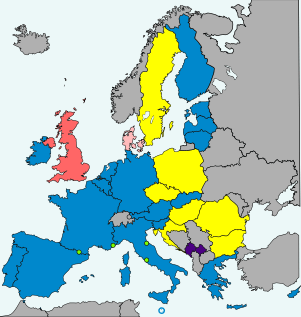Kosovo and the euro

-
<dt class="glossary " id="European Union (EU) member states" style="margin-top: 0.4em;">European Union (EU) member states
- Non-EU member states
Before Kosovo declared independence in 2008, Kosovo unilaterally adopted the euro as its currency in 2002 when it was a United Nations mandate; although, it is not an official eurozone member.
Background
During the disintegration of Yugoslavia in the 1990s Kosovo unsuccessfully attempted to gain independence, and in 1998-1999 the situation escalated with the Kosovo War.
Kosovo declared independence on 17 February 2008. As of 1 December 2016, 110 out of 193 (57%) United Nations member states have formally recognised the Republic of Kosovo. Notably, 23 out of 28 (82%) member states of the European Union and 24 out of 28 (86%) member states of NATO have recognised Kosovo. Serbia refuses to recognise it.
Monetary situation prior to 1999
Before the establishment of UNMIK, Kosovo (as part of Serbia) was bound to Yugoslav monetary policy, and the Yugoslav dinar. However, war-time inflation and tensions with the Federal Republic of Yugoslavia had severely discredited the Yugoslav dinar. As a result, many preferred to use and hoard foreign currencies instead of relying on the dinar. The most frequently used foreign currency was the German mark, although the U.S. dollar and Swiss franc were also widely used.
Introduction of the mark
In the immediate post-conflict period, other currencies – especially the Deutsche Mark – were widely used alongside the dinar. In September 1999, UNMIK produced a regulation accepting the use of other currencies; this recognised the status quo.[1] The Yugoslav dinar was never officially withdrawn from circulation, but its use was "not encouraged". The use of other currencies, mainly the U.S. dollar, also continued.[lower-alpha 2][2] The Bundesbank was not informed in advance, and did not send any additional coins and notes to Kosovo for the changeover. But since there were no restrictions on the import and export of German marks, and many Kosovars working abroad had sent money home, it was possible to supply Kosovo with sufficient marks.
The Yugoslav (and later Serbian) dinar continued to be widely used in Northern Kosovo and Serb enclaves throughout Kosovo.
Towards the euro
Like Germany, Kosovo switched to the euro on 1 January 2002. The Deutsche Mark remained legal tender in Kosovo until 9 March 2002.
The change to the euro was achieved in cooperation with the European Central Bank, and several national banks in the Eurozone. By December 2001, about 100 million euro in cash was frontloaded to the Banking and Payments Authority of Kosovo.[3] Kosovo does not mint any coins of its own.
EU membership
Kosovo is a potential candidate for accession to the EU. The European Commission and the ECB have voiced their discontent over countries unilaterally adopting the euro on several occasions in the past,[4] and it is unclear whether Kosovo would be able to accede to the EU while using the euro. Montenegro, which similarly unilaterally adopted the euro in 2002, had a statement attached to their Stabilisation and Association Agreement with the EU that read: "unilateral introduction of the euro was not compatible with the Treaty."[5] The issue is expected to be resolved through the accession negotiations process,[4] with the ECB having stated that the implications of unilateral euro adoption "would be spelled out at the latest in the event of possible negotiations on EU accession."[5] Diplomats have suggested that it's unlikely countries will be forced to withdraw the euro from circulation.[6][5]
See also
Notes
- ↑ Kosovo is the subject of a territorial dispute between the Republic of Kosovo and the Republic of Serbia. The Republic of Kosovo unilaterally declared independence on 17 February 2008, but Serbia continues to claim it as part of its own sovereign territory. The two governments began to normalise relations in 2013, as part of the Brussels Agreement. Kosovo has received recognition as an independent state from 110 out of 193 United Nations member states.
- ↑ The Bundesbank estimated in September 1999 that the 2 billion Deutsche Marks were held in former Yugoslavia. This would amount to more than 80 Marks per person.
References
- ↑ Mitra, Saumya (2001). Kosovo: economic and social reforms for peace and reconciliation. p. 22. ISBN 978-0-8213-4942-7.
- ↑ Tagesspiegel (1999). Deutsche Währung wird auch im Kosovo offizielles Zahlungsmittel - die Bundesbank wurde nicht gefragt (in German), 1999-09-07.
- ↑ Michel Svetchine, Kosovo experience with euroization of its economy
- 1 2 "EU warns Montenegro over Euro". B92. 2007-10-10. Retrieved 2011-09-09.
- 1 2 3 "Montenegro heading for EU membership". 2007-10-24. Retrieved 2013-02-19.
- ↑ "EU to question Montenegro's use of euro". 2007-10-08. Retrieved 2013-02-19.
Bibliography
- Bogetic, Zeljko (2000). OFFICIAL DOLLARIZATION: CURRENT EXPERIENCES AND ISSUES. Cato Journal, Vol.20, No.2 (Fall 2000).
- BQK (2010).
- NRC Handelsblad (1999). Kosovo krijgt douane en Duitse mark, 4 September 1999.
- Starr, Martha (2004). Monetary policy in post-conflict countries: Restoring credibility. American University, May 2004.
- Svetchine, Michel (2005). KOSOVO EXPERIENCE WITH EUROIZATION OF ITS ECONOMY. Central Bank of Albania.
- Schon, Gerard (2008). Euro Munzkatalog.